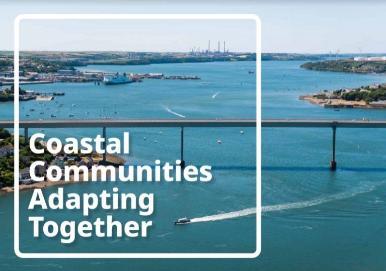
CCAT (Coastal Communities Adapting Together) was a pilot project that ran from 2019 to 2021. It was led by UCD and part-funded by the European Regional Development Fund through the Ireland Wales Programme.
Engaged Research
CCAT set out to build adaptive capacity to change in Irish Sea coastal communities through citizen engagement in activities such as participatory mapping, geodesign, geogames, online events, and the creation of interactive teaching resources. The project aimed to engage a broad cross-section of the community with change; build support for climate adaptation; generate a renewed sense of belonging and pride in the two case study areas; and facilitate cross-border understanding and collaboration with coastal change.
Project
The project was led by UCD in partnership with Fingal County Council, UCC, Cardiff University, Pembrokeshire Coastal Forum and the Port of Milford Haven in Wales. It successfully developed a range of tools for engaging with local authorities, educators, young people, community groups, policymakers and academics.
Dr Philip Crowe's idea for the project derived from his doctoral research on Patrick Geddes, a Scottish botanist and founding father of the town planning movement.
Geddes’ work to transition from the unhealthy industrial city (of the late 1800s) to a new healthy and energy-efficient future city has obvious parallels today. He identified that major societal transitions were only possible with the involvement of everyone, and a shared understanding of the challenges. He put emphasis on citizen engagement and awareness-raising, using two principal mechanisms: public participation events that provided access to knowledge, and activities that co-produced knowledge. The CCAT project explored Geddes’ ideas in the 21st century using digital tools,
The project’s closing event Building climate action locally: tools from the CCAT project (February 2022) showcased some of the tools developed, it can be viewed on the CCAT YouTube channel here.
One of the major outcomes of the project is the UCD Earth Institute Citizens’ Observatory. This initiative provides researchers and students with an easy way to create participatory mapping projects without any knowledge of GIS or computer programming. The surveys created will provide citizens with an easy way to contribute to research projects and shape the world around them.
UCD Impact Case Study
Dr Karen Foley and Dr Philip Crowe from UCD School of Architecture, Planning and Environmental Policy have produced a case study to capture the impacts of the research and public engagement carried out as part of CCAT. You can read the study 'Empowering People to Address the Problems of Climate Change' here.
For further information visit the CCAT website.